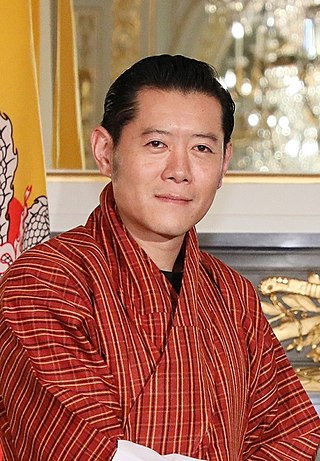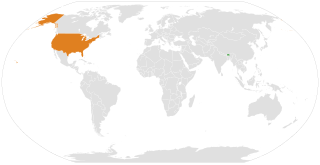Rife, Bhutan | |
|---|---|
| Coordinates: 27°53′N90°31′E / 27.883°N 90.517°E | |
| Country | |
| District | Bumthang District |
| Time zone | UTC+6 (BTT) |
Rife, Bhutan is a town in Bumthang District in central Bhutan. [1]
Rife, Bhutan | |
|---|---|
| Coordinates: 27°53′N90°31′E / 27.883°N 90.517°E | |
| Country | |
| District | Bumthang District |
| Time zone | UTC+6 (BTT) |
Rife, Bhutan is a town in Bumthang District in central Bhutan. [1]

Bhutan's early history is steeped in mythology and remains obscure. Some of the structures provide evidence that the region has been settled as early as 2000 BC. According to a legend it was ruled by a Cooch-Behar king, Sangaldip, around the 7th century BC, but not much is known prior to the introduction of Tibetan Buddhism in the 9th century, when turmoil in Tibet forced many monks to flee to Bhutan. In the 12th century, the Drukpa Kagyupa school was established and remains the dominant form of Buddhism in Bhutan today. The country's political history is intimately tied to its religious history and relations among the various monastic schools and monasteries.

Thimphu is the capital and largest city of Bhutan. It is situated in the western central part of Bhutan, and the surrounding valley is one of Bhutan's dzongkhags, the Thimphu District. The ancient capital city of Punakha was replaced by Thimphu as capital in 1955, and in 1961 Thimphu was declared as the capital of the Kingdom of Bhutan by the 3rd Druk Gyalpo Jigme Dorji Wangchuck.

The Government of Bhutan has been a constitutional monarchy since 18 July 2008. The King of Bhutan is the head of state. The executive power is exercised by the Lhengye Zhungtshog, or council of ministers, headed by the Prime Minister. Legislative power is vested in the bicameral Parliament, both the upper house, National Council, and the lower house, National Assembly. A royal edict issued on April 22, 2007 lifted the previous ban on political parties in anticipation of the National Assembly elections in the following year. In 2008, Bhutan adopted its first modern Constitution, codifying the institutions of government and the legal framework for a democratic multi-party system.

Bhutan has diplomatic relations with 54 of 193 member states of the United Nations and the European Union. Bhutan's limited number of such relations, including the absence of formal relations with any of the permanent members of the United Nations Security Council, is part of a deliberate isolationist policy of limiting foreign influence in the state. This stance has been safeguarded by close relations with India, of which Bhutan has previously been considered a protected state.

The Kingdom of Bhutan is divided into 20 districts. Bhutan is located between the Tibet Autonomous Region of China and India on the eastern slopes of the Himalayas in South Asia.

Gross National Happiness (GNH), sometimes called Gross Domestic Happiness (GDH), is a philosophy that guides the government of Bhutan. It includes an index which is used to measure the collective happiness and well-being of a population. Gross National Happiness Index is instituted as the goal of the government of Bhutan in the Constitution of Bhutan, enacted on 18 July 2008.

Bhutan, officially the Kingdom of Bhutan, is a landlocked Southern Asian country, which is situated in the Eastern Himalayas, between China in the north and India in the south. A mountainous country, Bhutan is known locally as "Druk Yul" or "Land of the Thunder Dragon", a name reflecting the cultural heritage of the country. The exonym Bhutan likely derives from the Prakrit hybrid word Bhŏṭṭaṃta, a name referring to its geographical proximity to Tibet. Nepal and Bangladesh are located near Bhutan but do not share a border with it. The country has a population of over 727,145 and territory of 38,394 square kilometres (14,824 sq mi) and ranks 133rd in terms of land area and 160th in population. Bhutan is a constitutional monarchy with a king as the head of state and a prime minister as the head of government. Vajrayana Buddhism is the state religion and the Je Khenpo is the head of state religion.

Jigme Khesar Namgyel Wangchuck is the Druk Gyalpo, the monarch of the Kingdom of Bhutan. After his father Jigme Singye Wangchuck abdicated the throne in his favor, he became the monarch on 9 December 2006. A public coronation ceremony was held on 6 November 2008, a year that marked 100 years of monarchy in Bhutan.

The French Internet site "Aide à l'Eglise en détresse" puts the figure of Christians in Bhutan at 12,255, with 1,000 Roman Catholics, making it a total of 0.9% of the population. The population also consists of 84% Buddhists, 11.4% Hindus, 3.4% Animists and 0.3% uncategorized.

The bilateral relations between the Himalayan Kingdom of Bhutan and the Republic of India have been traditionally close and both countries share a "special relationship", making Bhutan a protected state, but not a protectorate, of India. India remains influential over Bhutan's foreign policy, defence and commerce. Bhutan is the largest beneficiary of India's foreign aid.

The Kingdom of Bhutan and the People's Republic of China do not maintain official diplomatic relations, and relations are historically tense. The PRC shares a contiguous border of 470 kilometers with Bhutan, and its territorial disputes with Bhutan have been a source of potential conflict. Since the 1984, the two governments have conducted regular talks on border and security issues to reduce tensions.
The Miss Bhutan is a national beauty pageant based in Bhutan. Since 2022, the winner will compete at Miss Universe pageant.

The Druk Gyalpo is the head of state of the Kingdom of Bhutan. In the Dzongkha language, Bhutan is known as Drukyul which translates as "The Land of the Thunder Dragon". Thus, while kings of Bhutan are known as Druk Gyalpo, the Bhutanese people call themselves the Drukpa, meaning "people of Druk (Bhutan)".
Capital punishment in Bhutan was abolished on March 20, 2004 and is prohibited by the 2008 Constitution. The prohibition appears among a number of fundamental rights guaranteed by the Constitution; while some fundamental rights—such as voting, land ownership, and equal pay—extend only to Bhutanese citizens, the prohibition on capital punishment applies to all people within the kingdom.

Bhutan and the United States have no formal diplomatic relations, but relations between the two nations are viewed as "friendly and close", due to shared values between the two countries. The increasingly close relationship between India and the U.S. has also helped to improve U.S.–Bhutanese relations.